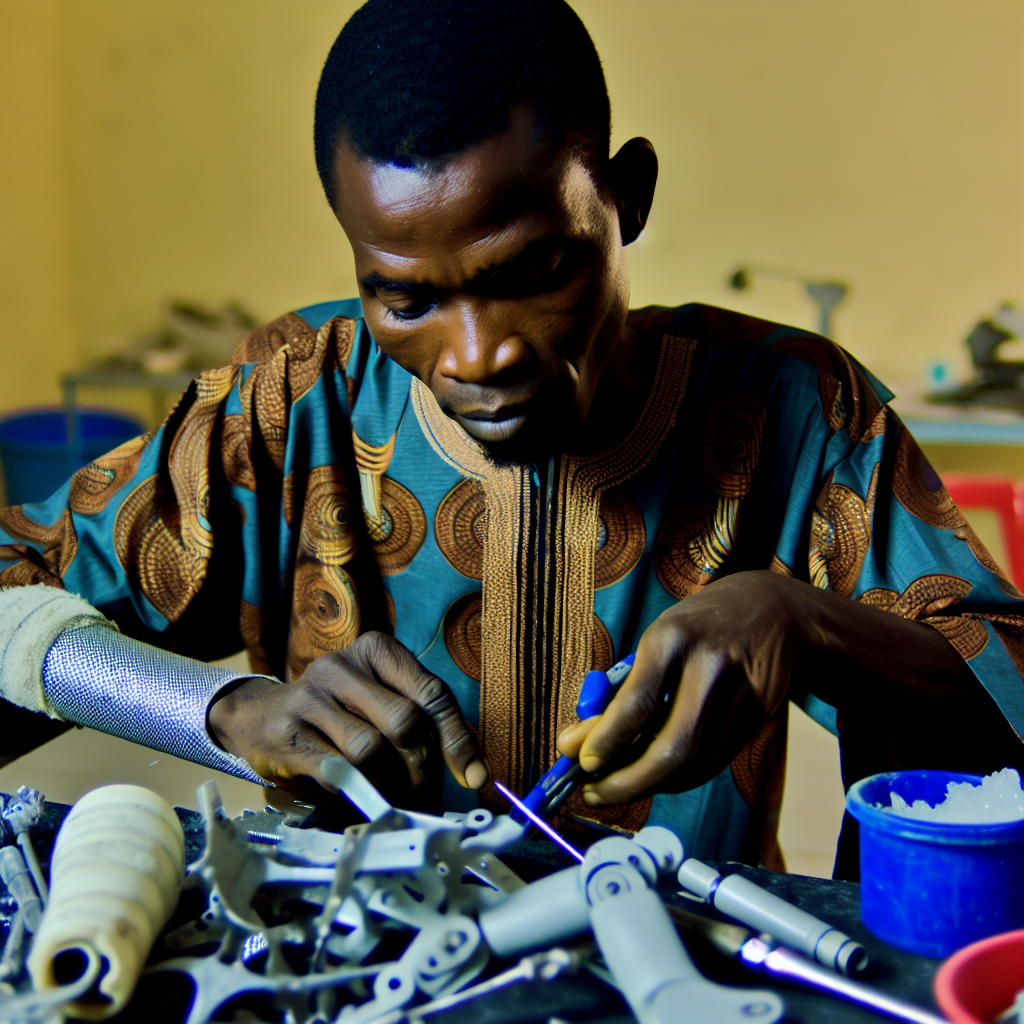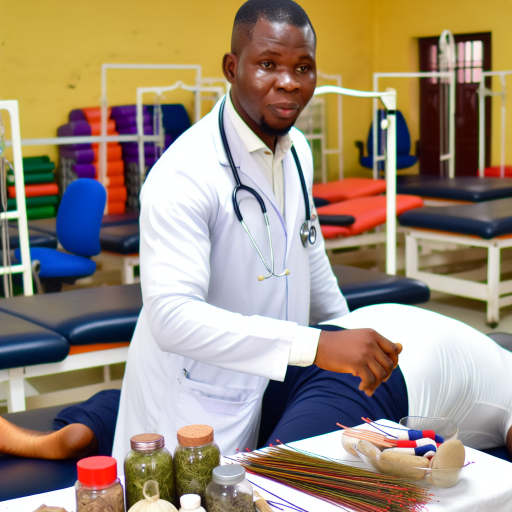Introduction
Orthopaedic technology in Nigeria plays a crucial role in the healthcare sector by providing solutions for musculoskeletal issues.
These professionals are vital in restoring mobility and improving the quality of life for patients.
Challenges Faced by Orthopaedic Tech Professionals in Nigeria
- Inadequate training and skill development opportunities for orthopaedic tech professionals.
- Shortage of orthopaedic technicians in healthcare facilities, leading to increased workload.
- Lack of standardized regulations and guidelines for orthopaedic technology practice in Nigeria.
- Limited funding and resources for orthopaedic technology departments in healthcare institutions.
- High cost of orthopaedic equipment and devices, making it inaccessible to many patients.
- Limited awareness and understanding of the role of orthopaedic tech professionals in the healthcare system.
These challenges hinder the effective delivery of orthopaedic care in Nigeria, impacting patient outcomes and overall healthcare quality.
Addressing these issues through better training, investment in technology, and policy reforms is essential to improve the orthopaedic technology sector in the country.
Challenges in Orthopaedic Tech in Nigeria
One major challenge in the field of orthopaedic technology in Nigeria is the lack of adequate infrastructure.
This includes limited access to specialized equipment and tools necessary for complex orthopaedic procedures.
Lack of infrastructure
Due to the lack of proper infrastructure, healthcare facilities in Nigeria often struggle to acquire specialized equipment and tools needed for orthopaedic procedures.
This limitation hinders the ability of healthcare professionals to provide the best possible care to their patients.
Limited access to specialized equipment and tools
Alongside the lack of specialized equipment, there is also a shortage of facilities capable of conducting orthopaedic procedures in Nigeria.
This means that patients may have to travel long distances to access the care they need, leading to delays in treatment and poorer outcomes.
Impact on quality of care for patients
The lack of infrastructure in orthopaedic technology in Nigeria ultimately impacts the quality of care that patients receive.
Without access to the necessary tools and facilities, healthcare professionals may struggle to provide timely and effective treatment, leading to poorer patient outcomes.
Shortage of Trained Professionals
In Nigeria, one of the major challenges in orthopaedic technology is the shortage of trained professionals in this field.
This shortage has several implications for the quality of care provided to patients.
Insufficient Number of Orthopaedic Technicians and Specialists
The first issue contributing to the shortage of trained professionals is the insufficient number of orthopaedic technicians and specialists in the country.
This scarcity makes it difficult to meet the growing demand for orthopaedic services.
Lack of Educational Programs for Training in Orthopaedic Technology
Another factor that exacerbates the shortage of trained professionals is the lack of educational programs for training in orthopaedic technology.
Without proper training opportunities, aspiring professionals are unable to enter the field.
Strain on Existing Professionals Leading to Burnout
Furthermore, the existing professionals in the field are often overworked due to the shortage of staff.
This strain on existing professionals can lead to burnout and decreased quality of care for patients.
Addressing the shortage of trained professionals in orthopaedic technology in Nigeria is crucial for improving the quality of care provided to patients in need of orthopaedic services.
See Related Content: Understanding Restorative Dental Terminology
Financial constraints in the orthopaedic tech field in Nigeria pose significant challenges for healthcare providers and patients alike.
Let’s delve into some of the key issues:
High cost of orthopaedic equipment and materials
One of the major obstacles faced by orthopaedic practitioners in Nigeria is the exorbitant price of equipment and materials needed for diagnosis and treatment.
This high cost makes it difficult for hospitals and clinics to invest in state-of-the-art technology, hindering the quality of care provided to patients.
Limited funding for research and development
Research and development in orthopaedic technology are crucial for advancing treatment options and improving patient outcomes.
However, in Nigeria, there is a lack of adequate funding for R&D in this field.
This limitation hampers innovation and stunts the growth of orthopaedic tech in the country.
Difficulty in procuring necessary resources for orthopaedic procedures
Accessing essential resources for orthopaedic procedures, such as implants, surgical instruments, and specialized tools, is often challenging in Nigeria.
The scarcity of these resources can lead to delays in treatment and compromise the quality of care provided to patients.
Explore Further: Nutritional Guidelines for Nigerian Children
Inadequate Regulatory Framework
- Lack of clear guidelines and standards for orthopaedic tech practice
- Absence of proper oversight and monitoring of orthopaedic facilities
- Potential risks for patients due to lack of regulation
Lack of Clear Guidelines and Standards for Orthopaedic Tech Practice
One of the major challenges in orthopaedic tech in Nigeria is the absence of clear guidelines and standards for practice.
This lack of regulatory framework makes it difficult for professionals to adhere to best practices, leading to inconsistencies in care delivery.
Absence of Proper Oversight and Monitoring of Orthopaedic Facilities
Another significant issue is the inadequate oversight and monitoring of orthopaedic facilities in the country.
Without proper regulation, there is a risk of substandard care being provided to patients, jeopardizing their health and well-being.
Potential Risks for Patients Due to Lack of Regulation
The absence of a robust regulatory framework poses serious risks to patients seeking orthopaedic care.
Without proper monitoring, there is a higher likelihood of medical errors, infections, and other complications that could have been prevented with stricter regulations.
Addressing the challenges of inadequate regulatory framework in orthopaedic tech in Nigeria is crucial to improving the quality of care provided to patients.
The establishment of clear guidelines, standards, and oversight mechanisms is essential for ensuring the safety and well-being of individuals seeking orthopaedic treatment in the country.
Transform Your Career with Expert Guidance
Get personalized mentorship consulting that’s tailored to your unique path. Our expert advice is actionable and exclusive.
Get StartedDiscover More: The Role of Veterinary Medicine in Nigerian Agriculture

Impact of COVID-19
- Disruption of orthopaedic services and procedures
- Challenges in maintaining safety protocols and hygiene practices
- Increased burden on orthopaedic tech professionals in managing cases during the pandemic
The COVID-19 pandemic has had a significant impact on the orthopaedic tech sector in Nigeria.
With the outbreak of the virus, hospitals and clinics were forced to reduce or even halt orthopaedic services and procedures to prioritize the treatment of coronavirus patients.
This disruption in services has led to delays in surgeries, follow-up appointments, and rehabilitation programs for orthopaedic patients.
Disruption of Orthopaedic Services
One of the major challenges faced by orthopaedic tech professionals during the pandemic is the disruption of services.
Many elective surgeries had to be postponed, leading to a backlog of cases that need urgent attention.
This delay not only affects the health and well-being of patients but also puts additional strain on healthcare facilities and professionals.
Maintaining Safety Protocols
Another challenge is the difficulty in maintaining safety protocols and hygiene practices in orthopaedic facilities.
With the need to prevent the spread of the virus, healthcare workers have had to adapt to new protocols and procedures to ensure the safety of both patients and staff.
This includes wearing personal protective equipment, practicing social distancing, and disinfecting equipment and surfaces regularly.
Increased Burden on Orthopaedic Tech Professionals
Furthermore, orthopaedic tech professionals have experienced an increased burden in managing cases during the pandemic.
With limited resources and manpower, professionals are tasked with caring for a higher number of patients while facing challenges such as staff shortages, limited access to medical supplies, and the risk of exposure to the virus.
This has put a strain on the mental and physical well-being of healthcare workers in the orthopaedic tech sector.
It is crucial for healthcare facilities and professionals to work together to address these challenges, prioritize the safety and well-being of patients, and adapt to the new normal in providing orthopaedic care during these unprecedented times.
See Related Content: Innovations in Ophthalmology: Nigerian Contributions
Challenges in Orthopaedic Technology in Nigeria
The challenges in orthopaedic tech in Nigeria include limited access to modern equipment and technology.
There is a critical need for increased investment and support for orthopaedic technology in the country.
Addressing these challenges is crucial for improving healthcare delivery and outcomes for patients in Nigeria.
Additional Resources
Traditional Bonesetters and Contemporary Orthopaedic Fracture …
David Adeyinka – Deputy volunteer manager – LinkedIn Nigeria




